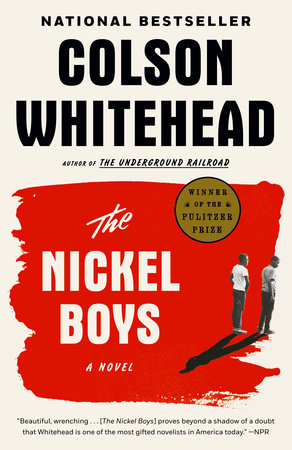
The Nickel Boys
by Colson Whitehead
literary
Doubleday – July 2019
Inspired by a true story.
Nowadays, we see this phrase, or variations on it, in plentiful amounts across the spectrum of film, TV, books, and theater. Oftentimes, this language is implemented for more of a superficial reason—producers or creatives looking to protect themselves against a potential lawsuit—and other times it’s used to tip off the audience that there is a deeper, larger story lurking beneath the surface of the fictional piece they are about to consume.
The Nickel Boys, without a doubt, falls into the latter category.
And it is one of the most vital works of fiction of the last decade.
Colson Whitehead’s haunting, powerful, and altogether wrenching novel is inspired by the story of the Dozier School for Boys in Marianna, Florida. Dozier was a “reform school” responsible for the widespread abuse and murder of countless young men over the course of its 111 year operation. While The Nickel Boys’s narrative and its two African-American protagonists—Elwood and Turner—are fictional, the novel is grounded in fact, immaculately researched, and captures the horrors of systemic racism in America with unflinching honesty.
Published in July 2019 by Doubleday (Penguin), the book has racked up practically every award. It won the 2020 Pulitzer Prize for Fiction, was a New York Times best-seller, and the winner of the Kirkus Prize, to name a few. Whitehead is no stranger to critical acclaim. His previous novel, The Underground Railroad, also won the Pulitzer Prize and the National Book Award.
When it comes to dramatizing some of the darkest moments in the history of the United States, Whitehead is the best in the business. Through his insightful, thought-provoking, Hemingway-esque prose, he manages to thread the needle between fact and fiction with expert precision, making for a truly stunning, meticulously crafted work that packs an emotional punch only real life could provide.
Aside from the incredibly relevant social, political, and psychological themes the book tackles, there’s also a hefty amount of craft-based lessons to be had for writers of all skill levels. Probably the most vital takeaway of them all, however: using a true story as a springboard and not letting it completely dictate the direction of your work.
It sounds a bit counterintuitive at first. But it’s a “problem” that all writers who create fictional stories based on factual events deal with. How do you honor the truth—the history that compelled you to sit down at your computer and write in the first place—but also have creative ownership over the new piece of art that you’re sculpting?
The answer? Do the research, know every single fact of the true story cold, understand the overarching thematic essence of the piece, hang onto the feeling you had in your gut when you first stumbled upon it and what you want audiences to feel when reading or watching your own work. . . and then?
Put it all away and focus on finessing the best narrative you can.
Whitehead could have opted for a different route when writing The Nickel Boys. He could have taken a more nonfiction style approach to the story of the Dozier School for Boys. And that would have been great. In fact, there are a lot of incredible, hard-hitting journalistic pieces about the subject. However, it might not have carried the same emotional resonance of The Nickel Boys. By framing the story through the eyes of Elwood and Turner, the fictional protagonists, Whitehead takes us on devastating roller-coaster, one that simultaneously makes us sad and enraged—and is completely true to the ethos of the story that it is based on.
Especially in the times we find ourselves in today, The Nickel Boys couldn’t possibly be more timely. The world needs to read this book, and now more than ever, artists must strive to tell stories like this. After all, it’s down to art to change the hearts, minds, and spirits of a fractured, mourning world.
